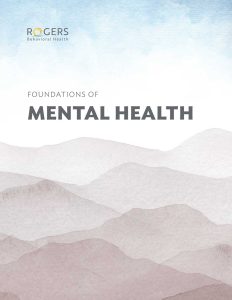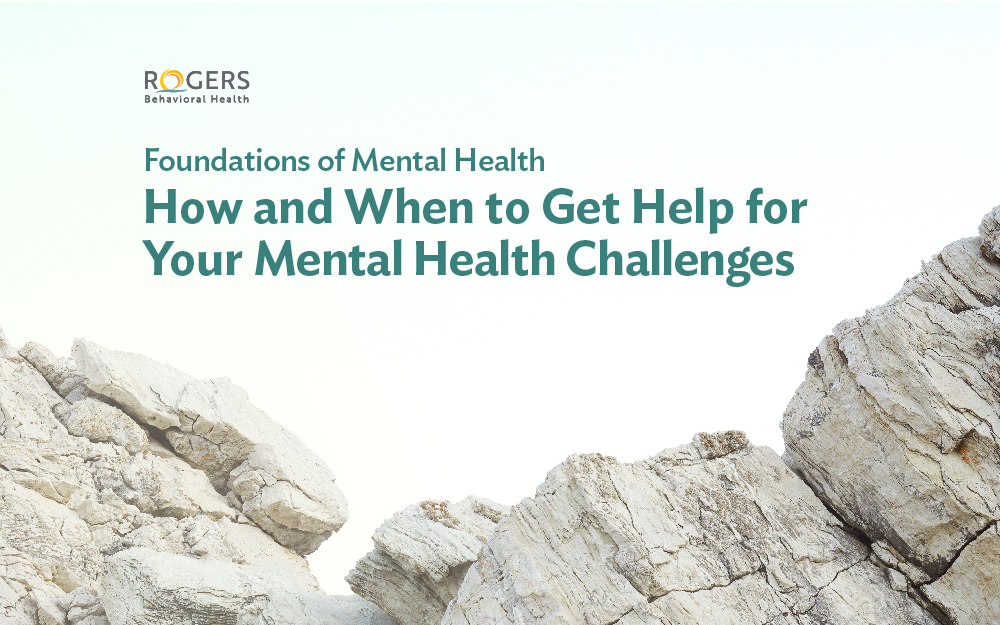We know that mental illness involves changes in how a person thinks, feels, or behaves, or a combination of those things. They’re most often associated with distress and problems functioning in school, at work, family activities, or performing daily routines.
These challenges are not a choice, and getting help for your mental health can feel like a giant jigsaw puzzle. Where do you even begin? Understanding your options is important, but starting the process can be overwhelming.
In part three of our series, Foundations of Mental Health: A Beginner’s Guide, Rogers Behavioral Health’s Dr. Heather Jones shares:
- Where you can start asking for help
- Treatment options
- Free mental health resources
Our goal is to empower you with the knowledge to take proactive steps toward better mental health.
Dr. Jones, where can a person begin to seek help for their mental health challenges?
One place to start is with your primary care provider if that’s someone you trust and have a good relationship with. You could consult with a faith leader in your place of worship or community, or talk with a trusted friend.  Sometimes, the people closest to us hold a wealth of information and support that they haven’t shared. By opening up about mental health, we can discover unexpected connections, feel validated, and even receive valuable resources and recommendations.
Sometimes, the people closest to us hold a wealth of information and support that they haven’t shared. By opening up about mental health, we can discover unexpected connections, feel validated, and even receive valuable resources and recommendations.
I also recommend professional organizations like NAMI, which is the National Alliance on Mental Illness. We have a list of mental health organizations below. Their websites give you the opportunity to find a therapist in your area who is usually credentialed, or vetted by those organizations. These websites are good places to start to find someone who specializes in what you’re struggling with or need support with.
Dr. Jones, what are common questions a person will be asked about their mental health?
Common questions that someone seeking mental health treatment will be asked are:
- Tell me what’s going on?
- What changes have you noticed in your life that led you to making this call/scheduling this appointment?
- Have there been any major life events that have contributed to the change(s), like a job loss, move, divorce, or some other extenuating circumstances that are impacting your mental wellness?
- How long have you been experiencing your symptoms?
- How has your sleep been impacted?
- Do you have a family history of depression, anxiety, or substance use?
Dr. Jones, what are misconceptions about therapy?
One misconception about therapy is that it’s going to involve unpacking your entire past and sharing all your deepest, darkest secrets. It doesn’t have to look like that. The relationship between a therapist and client is incredibly important and confidential. You need to build trust and go into it with the mindset that this is someone who is going to give you honest and real unfiltered feedback, which really is kind of a gift because there aren’t many people in our lives who have the ability of doing that.
People also think the length of therapy is indefinite. The most frequently occurring mental health conditions don’t require an ongoing relationship with a therapist for years and years. Some more chronic and acute illnesses require that level of support, but in most cases, going to therapy is like taking your car in for an oil change, regular maintenance, or a tune up. At other times, you may need more support, which is available in a higher level of care and intervention, to address the impact of a life event.
The goals of treatment are to:
- Help people reset
- Make sure people aren’t getting stuck in patterns of unhelpful thinking or behavior
- Help guide people through challenging times
- Build resilience skills to navigate challenges in the future.
Dr. Jones, what levels of treatment are available for mental health challenges?
There’s quite a range of options varying in intensity and length for someone needing mental health support. We encourage people to check coverage with their insurance provider in addition to looking for financial support options when considering their care needs. Different types of care include:
Community support groups
Organizations like NAMI offer support groups, which I highly recommend for people who already have a solid foundation in their recovery, whether that’s from substance use or another mental health challenge.
Professional therapist/outpatient care
Appointments could be as often as a couple of times a week, or as few as once a month to check in with a therapist, get regular feedback, and gain some problem-solving skills.
Partial and intensive hospitalization care
Specialized PHP (partial hospitalization programs) and IOP (intensive outpatient programs) are for people who need more treatment than traditional outpatient therapy. For example, at Rogers, PHP is around six and a half hours a day, five days a week, while IOP is three hours a day, starting with five days a week but can be offered less often depending on individualized need.
Residential care
The next level is residential services where a person lives in a therapeutic setting 24 hours a day, seven days a week for typically 30 to 90 days. Residential care is for people who need a lot of support and services to help them manage their symptoms.
Inpatient care
Inpatient treatment is a highly intensive treatment, typically lasting five to seven days, for someone who is having thoughts of hurting someone else or themselves, or is struggling with substance use and is in need of medical detox. The focus is on stabilization.
Dr. Jones, what is the role of medications in treatment?
Medication can help stabilize symptoms and be a great addition to therapy. Oftentimes, when we combine medication and therapy, a person experiences a better outcome, versus just having therapy or just taking medication. That isn’t necessarily the case for all mental health conditions. We know that there are specific therapies that are highly effective for different disorders. But there are times when the complexities and symptoms create a situation where we will recommend medications to enhance the impact of those therapies, so we’ve got the train running on both tracks for a long period of time in order to help a person maintain better well-being in the future.
Dr. Jones, what would you say to someone considering seeking mental health treatment?
It takes great courage to recognize that you need help, and to make the first call.  Taking that step is something to celebrate. Also, know that not every experience is going to be the right fit the first time. Remember, finding the right therapist is like finding the perfect pair of shoes—it might take a few tries. Don’t be discouraged if your first appointment doesn’t feel quite right. The first introduction might not feel great or may be really anxiety provoking. Try another appointment and if it still doesn’t feel right, try someone else.
Taking that step is something to celebrate. Also, know that not every experience is going to be the right fit the first time. Remember, finding the right therapist is like finding the perfect pair of shoes—it might take a few tries. Don’t be discouraged if your first appointment doesn’t feel quite right. The first introduction might not feel great or may be really anxiety provoking. Try another appointment and if it still doesn’t feel right, try someone else.
Good therapists put up a mirror and help you recognize what you might not in terms of your responses and your patterns of behavior, and they help you find solutions. It’s really important to take the time to find the right person to be your guide.
Mental health resources
Click here for a downloadable list of resources to help you and your loved ones navigate challenges that may arise.
Rogers offers mental health and addiction treatment
Rogers offers compassionate care for children, teens, and adults in a growing number of communities nationwide.
Next in Foundations of Mental Health: A Beginner’s Guide: How to talk about mental health and support those who do



